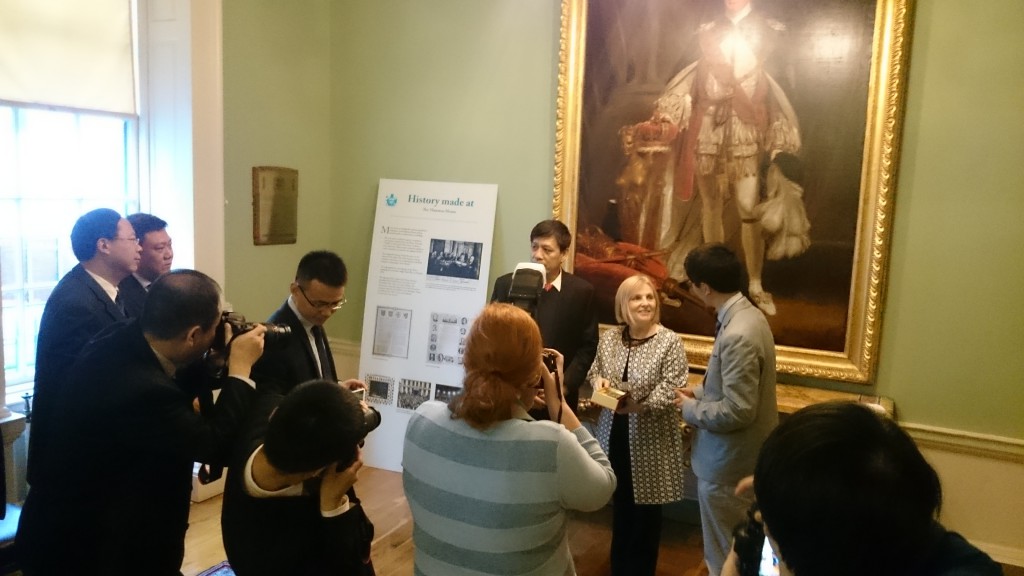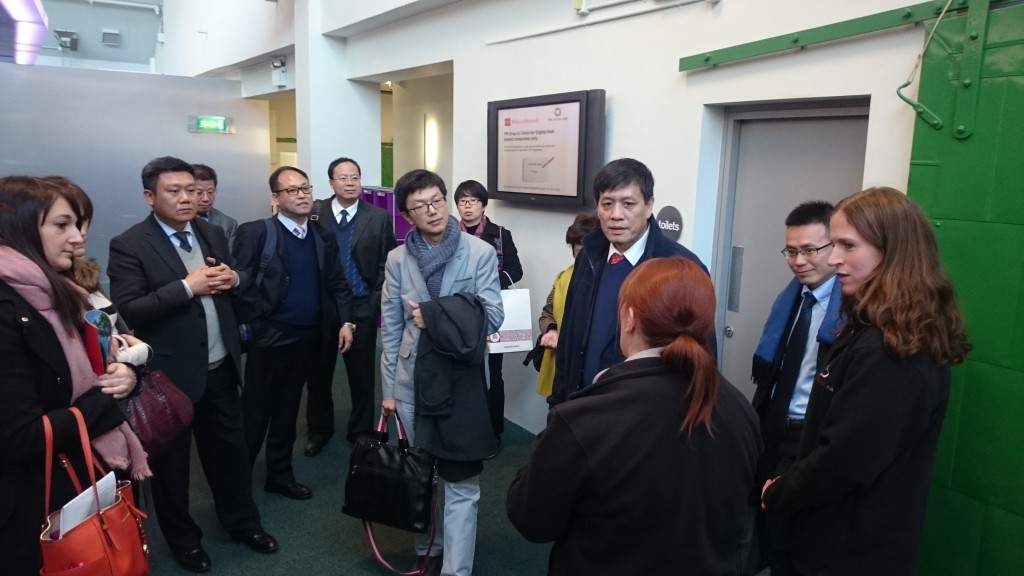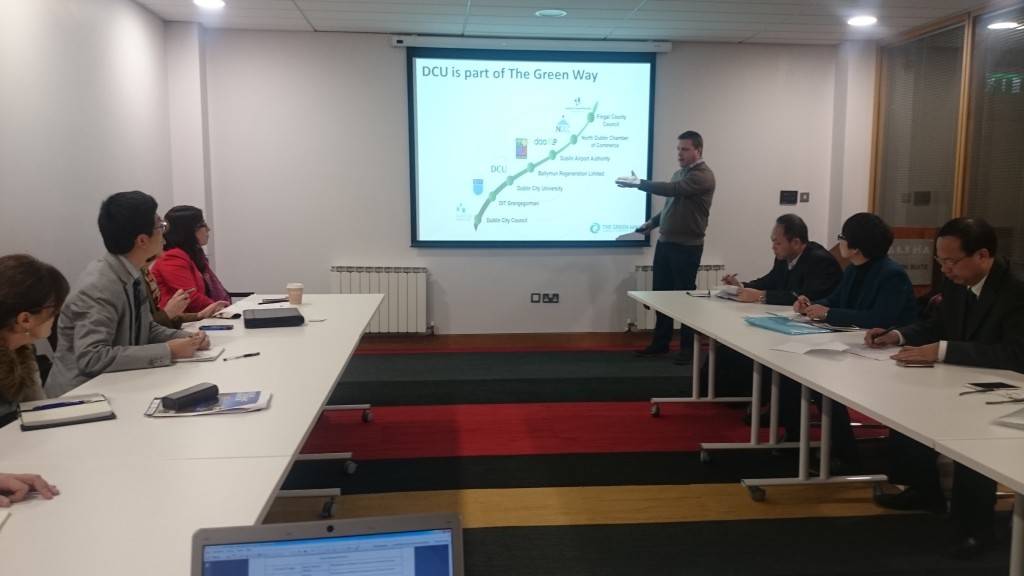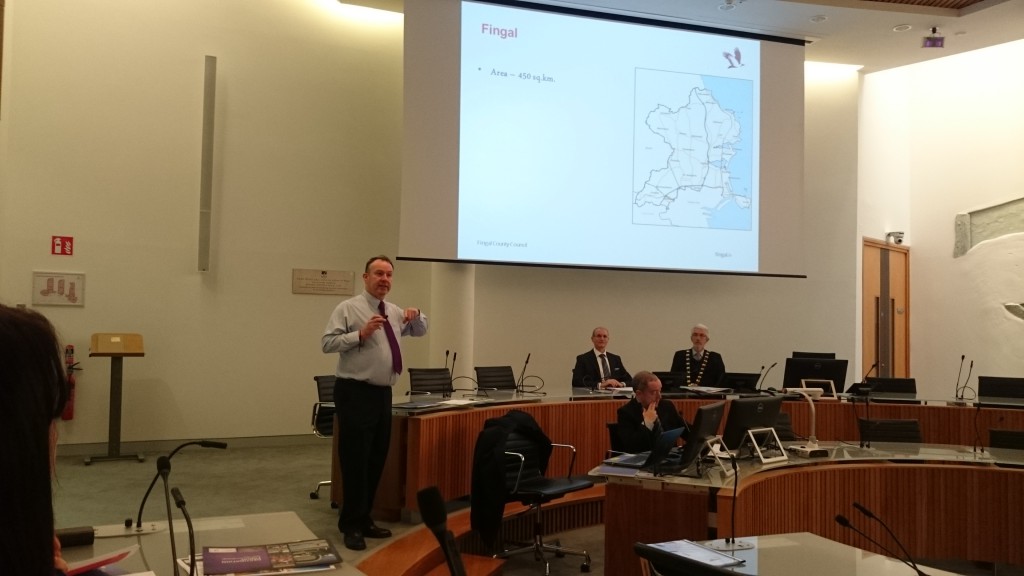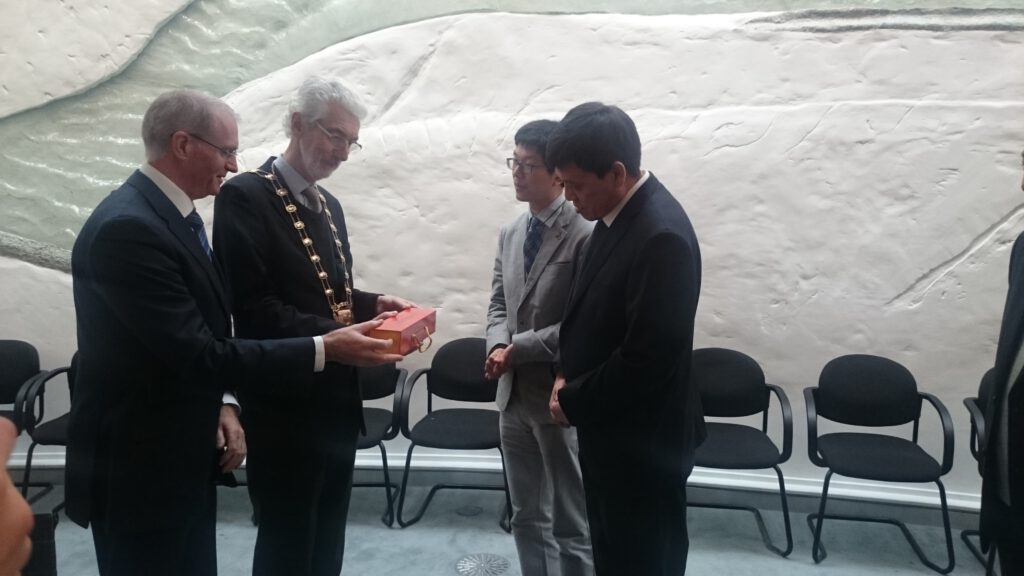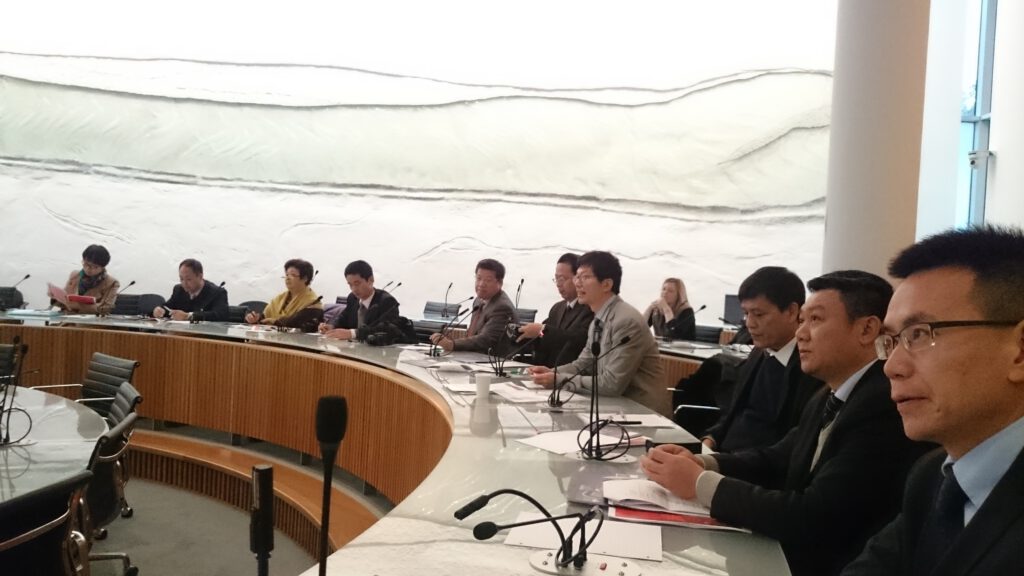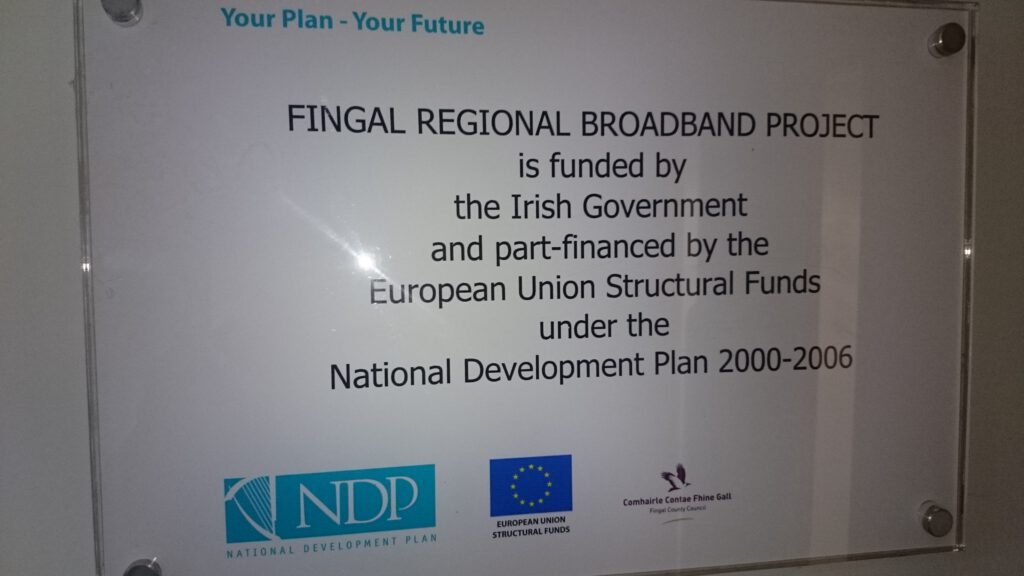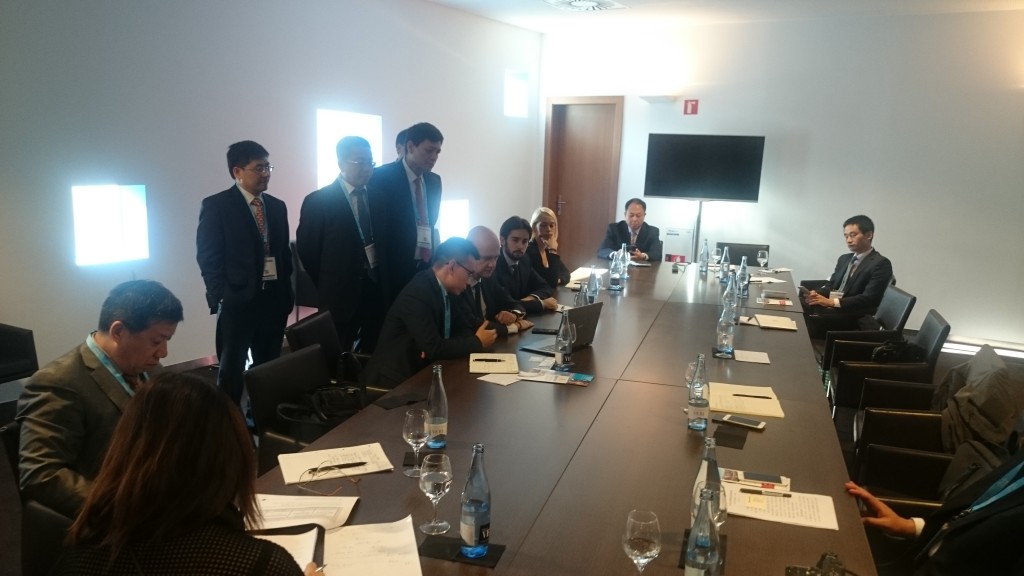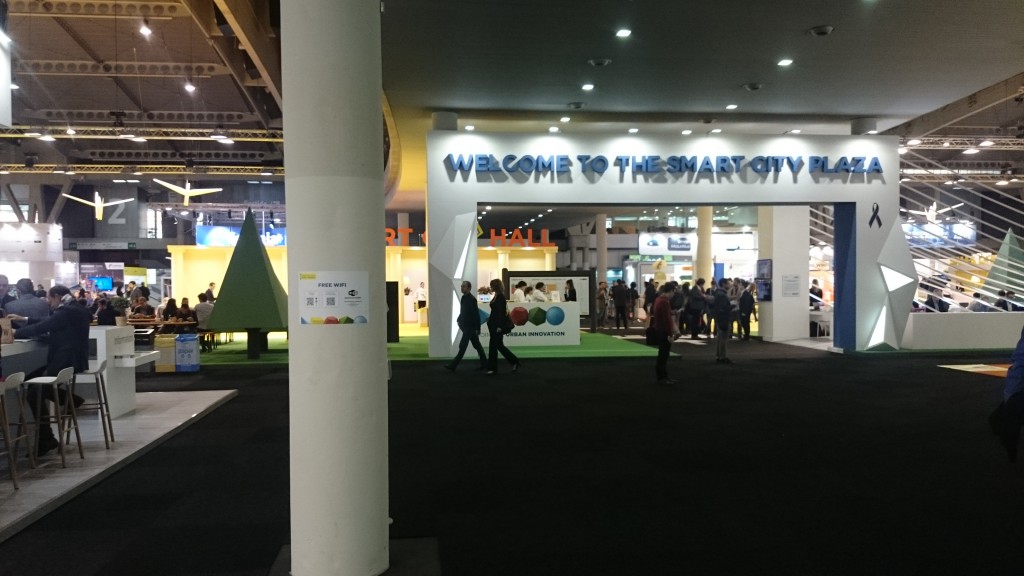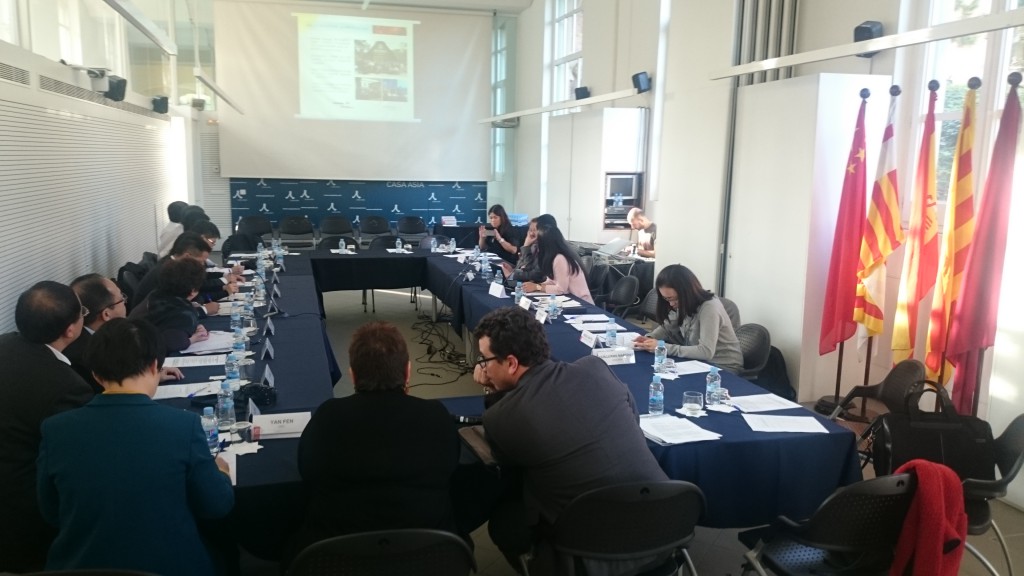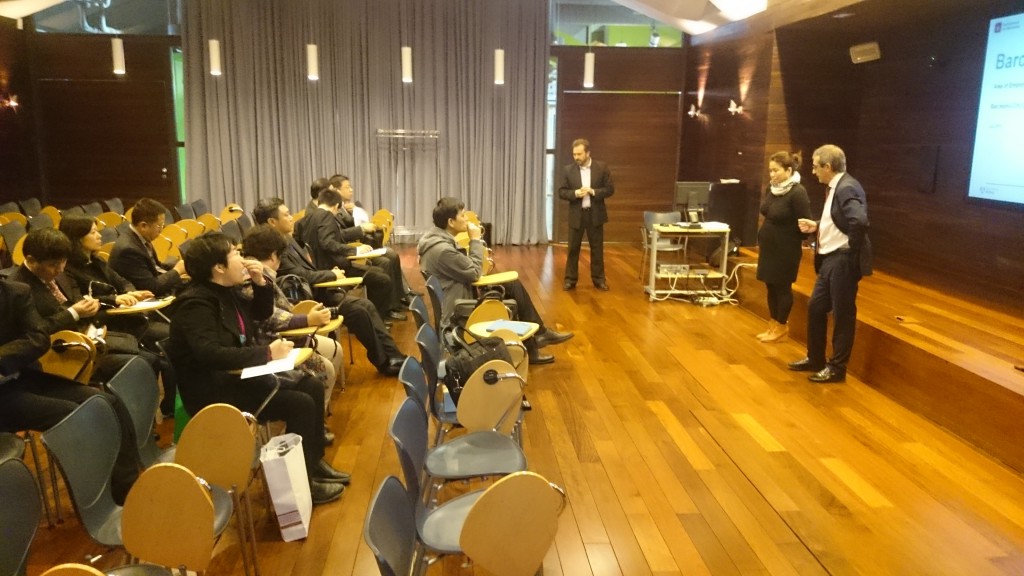Working visit of delegates from Wuhan and Chengdu to Dublin and Barcelona (16 – 20 November 2015)
The Agenda for Dublin and Barcelona_20151113.
The participants’ list is available here: World Cities_NDRC-Wuhan-Chengdu_Nov 15.
Summary of the working sessions
The programme took Chinese delegates to Dublin, Fingal and Barcelona.
a) Meetings in Dublin
Preparation meetings in Dublin took place on 4 November 2015, since the Chinese Mayor of Wuhan – who had planned a visit to Dublin outside the World Cities programme – requested support for an economic exchange forum taking place in Dublin on that day. World Cities team leader Pablo Gándara travelled to Dublin to support the meetings and communication with Dublin City Council. He also introduced the programme to a wider audience of the forum and explained the cooperation agenda to multipliers from the business and research community in Dublin. Mr Gándara also met Mr Peter Finnegan, Ms Lisa Joy and Ms Grainne Kelly from the International Relations Department of Dublin City Council in order to finalize the agenda for the Wuhan-Chengdu delegation visiting Dublin two weeks later.
Chinese delegates from these cities started their programme on Monday 16 November 2015 in Dublin, being welcomed by The Lord Mayor of Dublin – Ms Críona Ní Dhálaigh – at the Mansion House. Both sides exchanged views on the cooperation agenda that includes pilot projects on university cooperation, clean-technology and the digital economy. The Director for International Relations of Dublin City Council, Mr Peter Finnegan, introduced the smart city development areas and developed deeper ideas referring to the bilateral cooperation agenda, which centers on ICT urban development solutions and particularly on big data applications. Mr Finnegan introduced the best practice of Dublinked (http://dublinked.ie/), a partnership of the four Dublin Local Authorities and Maynooth University, aiming to drive innovation and collaboration in the development of new urban solutions, using open data and with the city region as a test bed. Local authorities made available 239 open datasets in areas including traffic, economy and innovation, environment and energy, planning and land use, etc. As a result, citizens, researchers, and government agencies developed several apps on issues like recycling, transportation, etc. (for an overview, please refer to http://www.dublindashboard.ie/pages/DublinApps). Chinese delegates were particularly interested in taking this best-practices to trigger innovation on urban development issues by Chinese start-ups. Bothe sides agreed on deepening communication in this area. Dublin City Council expressed also interest in fostering cooperation on the Dublin Innovation Festival, a project to support, illustrate and brand the considerable amount of talent and innovation which can be found throughout the city (http://www.innovationdublin.ie/festival/). Innovation Dublin is part of an Interreg EU-funded Open Innovation project which is a three year multi-million EU initiative designed to promote open innovation by businesses, higher education institutions and communities in north-west Europe (https://openinnovationblogdotnet.wordpress.com/).
Chinese delegates then visited the Digital Hub, a cluster of 90 tech-companies and 700 people (http://www.thedigitalhub.com/). Ms Joanne Kearney – Operations Manager of the hub – introduced the key features of the cluster, which is located on a former brown-field site of Dublin (including a former grain store for a large beer brewery). She explained that since 2003, more than 250 companies have passed through the hub, which is thus a very successful incubator for IT start-ups. Ms Ruth Flynn from The Digital Hub explained the urban regeneration plan and the support of the National Digital Research Centre. Chinese delegates then met two companies’ owners: Mr Kerrill Thornhill from maithu IT (http://www.maithu.com/) and Eoin Ó Ceallacháin from Juggle (https://juggle247.com/). Both start-ups explained their products (clinical support tools and financial management apps respectively) and the support that they receive from The Digital Hub. They were invited by Chinese delegates to explore market access chances in China.
The programme took delegates then to the Dublin City University (DCU) Innovation Campus. Ms Mary Colgan from DCU President’s Office explained the cooperation activities with the existing MoUs of DCU with Wuhan University (since 2005) and Shantou University (since 2013) in areas like electronic engineering. Mr Ronan Furlong from DCU’s Cleantech Innovation Campus explained the significance of the green economy growth in the North Dublin and Leinster area (http://dcu.ie/invent/new-innovation-campus.shtml). The Innovation Campus is becoming a national center for innovation in the Cleantech sector, supporting 200 jobs over the initial 18 months for Cleantech start-ups, SMEs and larger companies. Ms Aideen O’Hora – Executive Director of The Green Way cluster (http://www.thegreenway.ie/) – explained the collaboration of Dublin and Fingal County Councils in supporting the development of green technologies in the area The Green Way represents a unique ‘test-bed platform’ for global cleantech companies seeking to trial and commercialize their technologies on a municipal scale. Services include business mentoring and networking events, internationalisation support and location at the DCU Innovation Campus (http://www.dcualpha.ie/our-story/). The Green Way is a member of the Global Cleantech Cluster Association, a global group of 50 clusters (including World Cities partner cluster CLEAN in Copenhagen) which spans 10.000 companies (http://www.globalcleantech.org/). Ms O’Hora gave some examples of pilot projects including an EU-funded cooperation on wastewater treatment with Guinness brewery.
Discussions with Chinese experts centered on the China-Ireland Technology Fund and the possibilities of co-financing pilot projects under the World Cities project. Also synergies with Climate KIC were explored. Delegates agreed to cooperate in the pilot areas of clean technology and digital economy and initiated preparations for the follow-up to China in March 2016.
b) Meetings in Fingal
On the next day, Chinese delegates visited the Fingal County Council, where they were welcomed by Mr David O’ Connor, Mayor of Fingal County (http://www.fingal.ie/). Mr O’ Connor explained the main features of the county with a population of 273.991 inhabitants and an area of 450 km2. He introduced the main functions of the Council including waste and water management, economic development, housing and transportation services. Mr David Pryor from the Economic Development Department explained that Fingal is the second fastest-growing region in Ireland and has specialized on food processing, educational services and tourism. A very detailed cooperation proposal involved the tourism sector (Fingal China Tourism Strategy), introduced to the Chinese side by Ms Noeleen McHugh from Fingal County Council. The proposal is to establish concrete cooperation with a private tour operator from China as well as with the Tourism Bureaus of pairing Chinese cities (especially Chengdu).
Regarding academic cooperation, Mr Pryor proposed to involve the Institute of Technology Blanchardstown (ITB), which provides full-time and part-time higher education courses in several sectors relevant for cooperation with China including food processing, business and engineering (http://www.itb.ie/).
Chinese delegates agreed on the value proposal and established a coordination mechanism through the World Cities project. Delegates were then able to visit the Swords Castle Masterplan, a comprehensive programme of events and projects dealing with the history of Fingal area.
Meetings ended with a visit to the area of Howth, a peninsula in which the County has invested in tourism development including the Bull Island Interpretive Centre.
c) Meetings in Barcelona
Chinese representatives then flew to Barcelona where they absolved a two-day working programme. Meetings started at Fira di Barcelona, the public fair company owned by the City of Barcelona and the Chamber of Commerce ((http://www.firabarcelona.com/en). Fira di Barcelona has the second largest exhibition capacity in Europe and ranks number one in the mobile and smart city technologies. Discussions between Fira di Barcelona and Chinese delegates from Chengdu focused on the pilot project of organizing the Smart City Expo World Congress (SCEWC) in Chengdu. This is worldwide leading event for the smart city industry. Through activities, the exceptional congress featuring world renowned speakers, and popular side events, the SCEWC attracts thousands each year, making it consistently the top event for exhibitors and visitors alike. The 2014 edition recorded its best-ever figures with 10.838 visitors, 3.661 delegates and 275 exhibitors coming from 92 countries and 440 cities to share the latest thinking on current and future issues related to urban growth.
The idea to make a Chinese edition of the congress is one of the flagship projects of Barcelona-Chengdu cooperation within the World Cities scheme and grounds on regional editions of the Smart City congress held in other countries. The meeting – which was chaired by the General Management of the Fira – was complemented with a video-conference with the Deputy General Director of Sichuan Development and Reform Commission, Mr Deng ChangJin, who couldn’t travel to Barcelona due to short-term business commitments assigned by the Chinese Government. Mr Deng and Mr Ricard Zapatero – Director for International Business at Fira – agreed on the roadmap for the project implementation in the second half of 2016.
Delegates then visited the Smart City Expo World Congress (http://www.smartcityexpo.com/en/) and met with representatives of Andalucía Smart City Cluster – the pairing city of Shantou within the World Cities programme. They also participated in backstage networking meetings with representatives from India and Japan willing to establish cooperation with China and Europe in this area. Delegates also explored cooperation possibilities with leading companies and regions exhibiting at the expo, including Siemens and SAP, two companies already involved in the World Cities programme activities with China.
During afternoon, Chinese delegates participated at a B2B meeting held in Casa Asia (http://www.casaasia.eu/), a public foundation created in 2001 by the Spanish Ministry of Foreign Affairs and Cooperation, through its Spanish Agency for International Cooperation for Development (AECID), the Government of Catalonia and the Barcelona and Madrid City Councils. Due to its vast experience on cooperation with Asia in relevant issues including social, cultural, economic and environmental technologies, Casa Asia has been given the coordination function by Barcelona City Council. Mr Miquel Mateu from Barcelona City Council and Ms Montserrat Riba from Casa Asia welcomed the Chinese delegation (see picture).
Meetings at Casa Asia were attended by 14 Spanish representatives from business, R&D and politics and focused on the cooperation areas that had been identified in the first visit to China in May 2015:
- Smart City Development (cooperation with Fira de Barcelona)
- Support to SMEs and Innovation (different sectors including biotech, design, etc).
- Infrastructure and Port development
The first meeting focused on cooperation with the Catalonian Regional Development Agency ACCIO (http://accio.gencat.cat/cat/). With headquarters in Barcelona, ACCIO also operates from 36 offices around the world including three offices in China (Beijing, Shanghai and Hong Kong). The Chinese delegation from Wuhan and Chengdu agreed on exploring joint events in China with ACCIO in the areas of green city, smart city and industry 4.0. Technology cooperation was also agreed with Ms Carme Margeli from Eurecat, the recently launched technology center of Catalonia (www. http://eurecat.org/en/). Eurecat involves a multidisciplinary and international team made up of scientists and technologists from the industrial and digital fields, who are currently working on more than 160 highly strategic applied R&D projects. All projects aim to acquire new knowledge that is transferred to specific applications and solutions. Eurecat’s lines of research also address the strategy of innovation and research for the smart specialisation of Catalonia (RIS3CAT – http://s3platform.jrc.ec.europa.eu/) for the 2015-2020 period. Chinese delegates and Eurocat agreed on exploring a new cooperation agenda in the fields like big data (including the Big Data Congress in October 2016 in Barcelona), Industry 4.0 and new materials.
Meetings at Casa Asia were also held with Mr Jacinto Soler from PIMEC, the Association of Small and Middle Size Companies in Catalonia (http://web.pimec.org/). Mr Soler focused his cooperation agenda in the design sector in cooperation with the Barcelona Design Center (http://www.bcd.es/en). A pilot project here is being coordinated by Casa Asia.
Another area of cooperation between Barcelona and delegates from Wuhan and Chengdu was the academic education. Casa Asia involved two institutions from Barcelona, the ESCI-UPF School of International Studies (http://www.esci.upf.edu/en) and the University of Blanquerna (http://www.blanquerna.edu/en). Mr Ignacio Dualde from ESCI presented a cooperation agenda based on possible cooperation in training programmes for professionals dealing with post-graduate studies on international business. Mr Onno Seroo explained cooperation possibilities in the areas of international relations and communications. Chinese representatives from Wuhan were interested in developing student exchange, joint programmes and building an EU-China School of Finance.
Casa Asia and the World Cities staff offered support for the implementation of pilot projects in this area.
Meetings in Barcelona continued with a visit to Barcelona Activa and the Innovation District 22@Barcelona. Mr Xavier Tiana, Head of International Relations at Barcelona Metropolitan Area, explained the urban development plan of the region and the multi-level governance schemes in areas like waste management and sewage treatment. The metropolitan area of Barcelona has 4.79 million inhabitants.
Meetings in Barcelona ended with a closing session at the City Hall with the Director of the Department of International Relations, Mr Pablo Sánchez. He explained the project based approach of the City Council regarding the World Cities programme. Mr Sánchez mentioned the key priority areas of the urban development plan, including the reduction of traffic congestion through non-motorized solutions, the CO2 neutrality of the city as a mid-term goal, the municipal investments projects towards achieving a higher energy efficiency (public lightning, etc.) and the social economy in an ageing society. Ms Sánchez emphasized the European added-value of cooperating with cities like Dublin within the World Cities project.
The leader of the Wuhan delegation – Mr Zhang – expressed his gratitude on behalf of Wuhan City and referred to the Memorandum of Understanding signed in June 2015 in Brussels between Casa Asia and the Wuhan Municipal Government as the basis for the implementation of pilot projects. Mr Yang from NDRC expressed that the new Five-Year-Plan 2016-2020 will encourage the internationalisation of Chinese enterprises thus creating more possibilities for FDI into Europe.
The report is available upon request (pgandara@world-cities.eu).
Impressions
Dublin
Meeting with Mayor of Dublin
Meeting at The Digital Hub
Meeting at Dublin City University DCU
Meeting with Fingal County Council authorities, David Pryor
Meeting with Fingal Mayor David O’ Connor and Cllr. Kieran Dennison
Chinese delegates during the exchange session
Barcelona
Meeting and video conference between Fira de Barcelona and Chengdu Tianfu New District authorities.
Visit to Smart City Expo
Economic Exchange Workshop at Casa Asia
Meetings at Barcelona Activa – Innovation District

